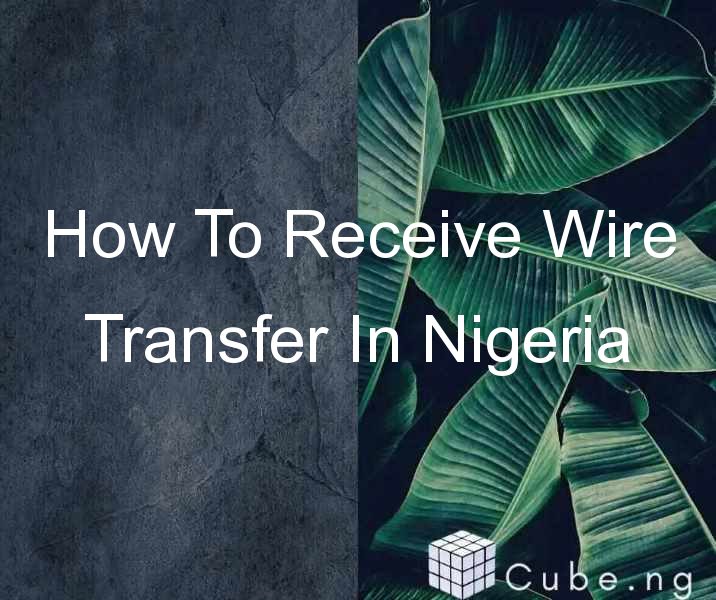How to Receive Wire Transfer in Nigeria
Are you expecting a wire transfer from a friend or a family member in another country? Or maybe you're receiving payment from a client or a business partner overseas? Regardless of the reason, receiving a wire transfer in Nigeria may seem like a daunting task, especially if you've never done it before. But don't worry, we've got you covered. In this article, we'll walk you through the steps of receiving a wire transfer in Nigeria, from opening a bank account to providing the necessary information to the sender, and everything in between. So let's get started.
Step 1: Open a Bank Account
The first step to receiving a wire transfer in Nigeria is to open a bank account. You can choose from a variety of banks in Nigeria, such as Access Bank, First Bank, GT Bank, and Zenith Bank, among others. When opening a bank account, you'll need to provide some personal information, such as your full name, date of birth, address, and valid identification, such as a driver's license or a passport. Once you've opened a bank account, you'll be assigned a unique account number, which you'll need to provide to the sender.
Step 2: Obtain Your Bank's SWIFT Code
Next, you'll need to obtain your bank's SWIFT code. The SWIFT code is a unique identification code for your bank that is used to facilitate international wire transfers. You can usually find your bank's SWIFT code on their website or by contacting their customer service department. Make sure you provide the correct SWIFT code to the sender, as sending the money to the wrong SWIFT code could result in delays or even loss of funds.
Step 3: Provide the Necessary Information to the Sender
Once you've opened a bank account and obtained your bank's SWIFT code, you'll need to provide the necessary information to the sender. This includes your full name, your bank's name and address, your bank's SWIFT code, and your bank account number. You may also need to provide additional information, such as your bank's routing number or intermediary bank information, depending on the specific requirements of the sender's bank.
Step 4: Wait for the Transfer to Arrive
After you've provided the necessary information to the sender, all you need to do is wait for the transfer to arrive. The time it takes for a wire transfer to arrive in Nigeria can vary depending on the sender's bank and the time of day the transfer was initiated. It's best to check with your bank to find out their specific policies and processing times for incoming wire transfers.
Step 5: Verify the Transfer and Withdraw Your Funds
Once the transfer has arrived, you'll need to verify that the funds have been deposited into your account. You can do this by checking your account balance or contacting your bank's customer service department. Once you've verified the transfer, you can withdraw your funds using your bank's ATM, online banking system, or by visiting a branch in person.
Common Questions About Receiving Wire Transfers in Nigeria
-
What fees are associated with receiving a wire transfer in Nigeria?
- Most banks in Nigeria charge a fee for incoming wire transfers. The fees can vary depending on the bank and the amount of the transfer. Make sure you check with your bank to find out their specific fees.
-
Can I receive a wire transfer in a different currency?
- Yes, you can receive a wire transfer in a different currency, such as USD or EUR. Your bank will convert the funds into Nigerian Naira using their current exchange rate.
-
What is the maximum amount of money I can receive through a wire transfer in Nigeria?
- The maximum amount of money you can receive through a wire transfer in Nigeria can vary depending on your bank's policies and regulations. It's best to check with your bank to find out their specific limits.
-
What happens if the sender provides the wrong information?
- If the sender provides the wrong information, such as the wrong SWIFT code or bank account number, the transfer may be delayed or even lost. It's important to double-check all information before initiating the transfer.
-
Are there any restrictions on receiving wire transfers in Nigeria?
- There may be restrictions on receiving wire transfers in Nigeria depending on the source and amount of the transfer. It's best to check with your bank and the Central Bank of Nigeria to find out their specific regulations and restrictions.
Conclusion
Receiving a wire transfer in Nigeria may seem complicated at first, but with the right information and preparation, it can be a smooth and easy process. Remember to open a bank account, obtain your bank's SWIFT code, provide the necessary information to the sender, wait for the transfer to arrive, and verify and withdraw your funds. As always, make sure you double-check all information and follow your bank's policies and regulations. Happy receiving!




